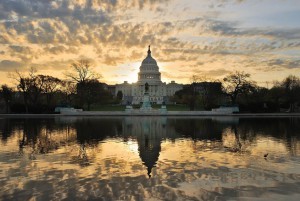Humanism on the Hill—Jared Huffman and the Congressional Freethought Caucus

It all started when one courageous member of Congress responded to a questionnaire from a nontheist political action committee
As you are well aware, our current political climate is toxic, and yet recent developments give me hope for the future. This past November, Congressman Jared Huffman (D-CA) publically confirmed that he is a humanist and agnostic. The announcement was the result of Rep. Huffman returning a candidate questionnaire to the Freethought Equality Fund, a political action committee affiliated with the Center for Freethought Equality (CFE), which is the political and advocacy arm of the American Humanist Association (AHA). I work for the CFE and run the Freethought Equality Fund PAC.
Huffman’s responses to the questionnaire were intriguing and I followed up with him by email, which led to a dinner invitation. Huffman and I were joined by AHA Executive Director Roy Speckhardt for dinner, where we discussed the issues an elected official might face by going public with a nontheistic identity, and we explored a path to determine whether or not to proceed with such an announcement. After the meeting, Huffman discussed his intention to go public with his family, friends, supporters, and colleagues to make sure there would be no surprises to those close to him and to explore the effect an announcement might have on his career. Most of the responses were positive, but his political contacts did express concern about how this could affect him politically—remember it had been ten years since the first member of Congress, Pete Stark (D-CA), announced he was a nontheist. Stark left Congress in 2013. Undaunted by the political concerns, Huffman agreed to go public. In an interview, he said his announcement was important to “make space” for nontheists to serve openly in a Congress dominated by religious members.
The response from his constituents, the people who determine if he will stay in Congress, was overwhelmingly positive in both personal interactions and on social media. The response from his colleagues in Congress was also positive, so much so that he and several of them talked about the idea of developing a caucus of like-minded members.
Huffman shared the idea with us and asked for our help in the endeavor. Needless to say, Speckhardt and I were very happy to be invited to participate in this important project. The members of Congress who attended the planning meetings—the first took place at Huffman’s Capitol Hill shared townhouse and the second was at the AHA headquarters —were excited by the possibilities of a caucus. We developed a mission statement and reviewed the process to become officially recognized as a Congressional Members Organization of the 115th Congress by the House of Representative’s Committee on House Administration. The paperwork was filed and approved in early April, and Huffman’s office issued a press release on April 30 announcing the formation of the caucus. In the announcement Huffman stated,
I’m thrilled to be a co-founder of the new Congressional Freethought Caucus, which will help spark an open dialogue about science and reason-based policy solutions, and the importance of defending the secular character of our government. There currently is no forum focused on these important issues, and with this Administration and certain members of Congress constantly working to erode the separation of church and state, this new caucus is both important and timely.
The Congressional Freethought Caucus has four goals:
- to promote public policy formed on the basis of reason, science, and moral values;
- to protect the secular character of our government by adhering to the strict Constitutional principle of the separation of church and state;
- to oppose discrimination against atheists, agnostics, humanists, seekers, and nonreligious persons, and to champion the value of freedom of thought and conscience worldwide; and
- to provide a forum for members of Congress to discuss their moral frameworks, ethical values, and personal religious journeys.
Congressman Jamie Raskin (D-MD), a co-chair of the Freethought Caucus, called the establishment of the caucus “historic.”
Two-and-a-half centuries after the Founders of our country separated church and state and guaranteed the individual freedoms of thought, conscience, speech, and worship, it is a high honor to be a co-founder and member of the Congressional Freethought Caucus, which is organizing to defend these principles and values against continuing attack.
The importance of the Freethought Caucus to the atheist and humanist community cannot be overstated. As Speckhardt said, “The very existence of this Congressional caucus for freethinkers and humanists is a marker of how far the movement for secular and nontheist equality has come. This significant step is also a new beginning for our country as both religious and non-religious leaders work to better the nation.” It is my hope that the caucus will normalize the participation of atheists and humanists in US politics by helping to end discrimination against nontheist candidates and elected officials, allow candidates and elected officials to be authentic about their religious beliefs, and encourage atheists, agnostics, and humanists to run for political office.
It’s important to reflect that all this happened as the result of one courageous member of Congress responding to a questionnaire from a nontheist political action committee.
To members of the atheist and humanist community, I urge you to become more involved in the political arena. Talk to your elected officials and candidates about our community and the issues we care about. Build relationships with your elected officials and encourage members of our community to run for office. Perhaps even become a candidate yourself. Your active participation will help improve the political climate of our country.
